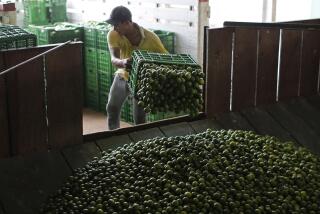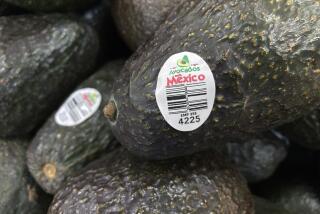Sticking with a dream whose day is nearly here
SANTA MARIA AYOQUEZCO, MEXICO — It has taken longer than they expected, but the 170 women who have pooled their savings to launch a bottling plant for nopal cactus here say it’s so close they can almost taste it.
The women had hoped to open the plant in summer, but a five-month siege by striking teachers in Oaxaca, the capital of the state with the same name, slowed the delivery of building materials.
But with order restored, the women say the opening of the plant is just weeks away.
Nopal is a local staple used in a variety of recipes, from sweet to savory. Residents here are combining money earned by family members working in the U.S. with grants from Mexico’s government to build the $1.5-million processing plant.
Their plan is to export thousands of jars of nopal a week for purchase by Oaxacans and cactus aficionados abroad. Their dream is to make the enterprise successful enough that loved ones will no longer have to go north of the border to find jobs.
“After six years of work, I think we’re finally there,” said Catalina Sanchez, who got the idea after tasting bottled nopal sold in California. “We’re hoping the factory will open in January.”
Oaxacan cactus tastes a lot better than the California variety, Sanchez said as she proudly showed off her nopal plot, the size of a football field. Each of the women in the enterprise tends her own plot. The cactus is grown without pesticides or chemical fertilizers.
“It grows slower this way and it doesn’t look as perfect, but it’s healthier,” Sanchez said.
Mild winter weather slows production of the young leaves, which are harvested from the tops of the waist-high plants. During the hot spring and summer, Sanchez said, the plants are cut twice a week, with an average yield of 2 pounds per square yard.
Though the strike slowed things down, the number of people involved in the project increased by several dozen from 134, and the number of investors in a distribution company on the California side also grew.
Nearly 60 Oaxacans in California have invested $100,000 to create the distribution company, which will seek to place the product at stores and markets, said Felix Cruz, a San Diego County resident and president of Chapulin Distributors.
Until the Oaxaca factory is up and running, Cruz said, there are no firm purchase commitments, although many restaurants and stores have expressed interest.
Investors became worried during the five-month conflict that paralyzed Oaxaca’s capital city, a 90-minute drive north. A statewide teachers strike that began in May grew into a broad leftist movement calling for the governor’s resignation. Protesters blocked roads, closed government buildings and scared away tourists.
The federal government intervened in November, evicting demonstrators who had been camping in the central square. The arrest of protest leaders this month took most of the steam out of the movement, and life has largely returned to normal.
For Sanchez and her partners, that means they can get the project back on track. They are awaiting delivery of machinery from Guadalajara to cut and clean the spiny cactus leaves. For now, they clean and bottle their samples by hand.
Meanwhile, workers are installing plumbing fixtures for the 40 people who will work at the factory when it opens. Floor tiles are being laid in a children’s day-care room. Outside, a service road needs to be cleared and paved. Gas lines are unfinished.
During a recent tour, several of the women imagined the factory open and operating. For years, the cactus made them money at the marketplace in Oaxaca city, where they traveled twice a week to sell the fresh leaves. Many made the trip alone, their husbands gone for months or years working in the United States.
“The day the factory opens will be beautiful for everyone,” said Lovigilda Perez. “A lot of people are saying that if this is successful, they’ll stay here to work. That’s our dream.”
Cecilia Sanchez of The Times’ Mexico City Bureau contributed to this report.
More to Read
Sign up for Essential California
The most important California stories and recommendations in your inbox every morning.
You may occasionally receive promotional content from the Los Angeles Times.










